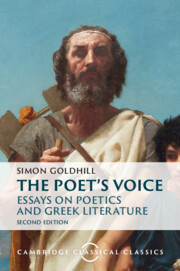Book contents
- Frontmatter
- Contents
- Foreword
- Preface
- Introduction: sounding out The Poet’s Voice
- 1 The poet hero: language and representation in the Odyssey
- 2 Intimations of immortality: fame and tradition from Homer to Pindar
- 3 Comic inversion and inverted commas: Aristophanes and parody
- 4 Framing, polyphony and desire: Theocritus and Hellenistic poetics
- 5 The paradigms of epic: Apollonius Rhodius and the example of the past
- Bibliography
- Index
5 - The paradigms of epic: Apollonius Rhodius and the example of the past
Published online by Cambridge University Press: 31 October 2024
- Frontmatter
- Contents
- Foreword
- Preface
- Introduction: sounding out The Poet’s Voice
- 1 The poet hero: language and representation in the Odyssey
- 2 Intimations of immortality: fame and tradition from Homer to Pindar
- 3 Comic inversion and inverted commas: Aristophanes and parody
- 4 Framing, polyphony and desire: Theocritus and Hellenistic poetics
- 5 The paradigms of epic: Apollonius Rhodius and the example of the past
- Bibliography
- Index
Summary
The avant-garde writers of the Hellenistic period demonstrate an acute sense of literary tradition. In the previous chapter we have already seen some of the ways in which Theocritus develops his distinctive fragmented and polyphonous voice in relation to the past. In the programmatic narrative of Idyll 7, the search for an exemplary voice recedes through a series of lost poets’ songs towards an always already distanced model of excellence. So in Idyll 11, the much-discussed Hellenistic technique of reversing and restructuring the phraseology of earlier writing finds a parallel in the appropriation and manipulation of a Homeric figure: the Cyclops is taken back to a green and loving youth, back to a time before Homer’s writing of him as a paradigm of monstrous brutality. Indeed, in Hellenistic poetry we see again and again a search for an original and originating moment in the past ’before Homer wrote’.
- Type
- Chapter
- Information
- The Poet's VoiceEssays on Poetics and Greek Literature, pp. 284 - 333Publisher: Cambridge University PressPrint publication year: 2024

